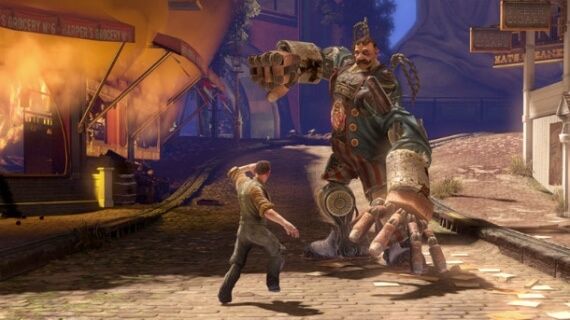Everyone likes rescuing the lady in distress and Bioshock: Infinite's story at heart does revolve around rescuing such a person, albeit with a few more difficulties for the protagonist. Booker DeWitt is to rescue the forlorn Elizabeth from captivity in the city of Columbia, Infinite's Rapture. Columbia is split into two factions attempting to control the fate of Elizabeth and either use or confine her power for the betterment of their own side. Game Informer recently talked to the game's creative director, all-around awesome guy Ken Levine, about the origins of the title's setting and story.
Columbia is just another city in America, except that they have seceded from the country to create their own ideological city in the sky. The kicker? Columbia was, at one point, a warship. Due to an international incident, it triggers Columbia's departure from America and thus starts a civil war within the airship that acts as the backdrop of the game's story: Two warring factions vying for power within the ship.
A gameplay demo shown to Game Informer details the depths of antagonist Saltonstall's idealism, touching on points of xenophobia and patriotism. Needless to say, Saltonstall will play a key role in the title and you can expect to see his face often.
Ken Levine goes on to say:
“There’s definitely a component in America today that nationalism is extremely important to certain people — a sense that America is a separate case. It’s something I’ve always found fascinating. It’s an interesting element to divide over — where you’re born. It’s kind of an accident, right?
And how porous those borders are — people who are in the same country with different ethnic backgrounds and religious backgrounds — there are a lot of ways to draw demarcations. It’s interesting to me how important those become to people and I wanted to explore that."
I told you earlier about Saltonstall, who will be leading his own group of people, aptly known as the Saltonstalls. The Saltonstalls want to do their best to prevent Elizabeth's powers from getting out. The counterpart group is known as the Vox Populi, whose goal is to promote freedoms to all citizens of Columbia, which includes freeing Elizabeth. For all of you Latin nerds, you'll recognize "vox populi" as meaning "voice of the people", an aptly used term for reflecting the group's goals. Levine compares the Vox Populi to a student movement or even anarchists.
Whereas the original Bioshock took inspiration from Ayn Rand, Infinite takes its from the numerous political movements during the 70s. Organizations like the Earth Liberation Front were used for inspiration, for example.
The most interesting thing I feel for Bioshock: Infinite has to be the thematic element of the story. The original Bioshock's allegory of people creating their own society, away from the dull lives of those who lived above the waves plays a nice contrast to the people who want to promote their ideals, the hard way. There are plenty of similarities between the two stories, but they still retain enough individualism that will keep the story fresh and intriguing enough to continue playing the game.
Story is only one part in the entirety of game that makes a it great, but if the game includes graphics like Bioshock 2, it will surely not disappoint. In fact, it will blow your mind. The steampunk-like look of the title will also add a nice bit of extra flair to the art style of the franchise, as well. You can find this evident in the new Big Daddy design, err Alpha that is. I'm certainly looking forward to this game and I think all of you should too.
Bioshock: Infinite reaches for the skies in late 2012 for Xbox 360, PS3, and PC.
Source: Game Informer

